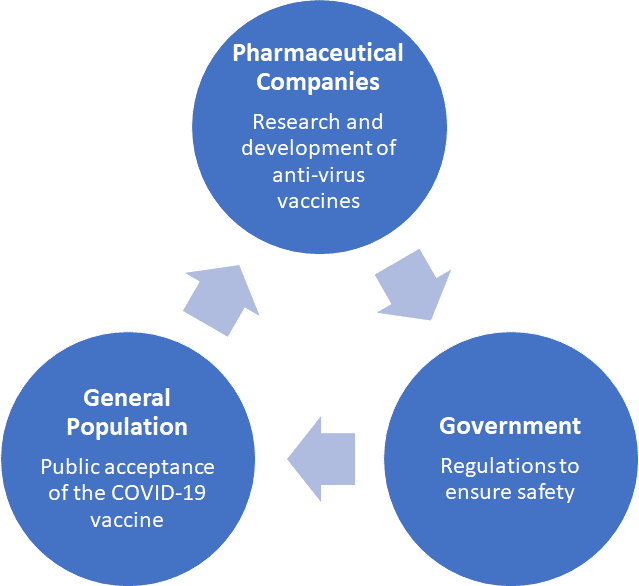News about the COVID-19 vaccine developed by Pfizer spread like wildfire amidst the many fake news about remedies to the highly contagious virus. According to Pfizer, the vaccine candidate is more than 90% effective in preventing COVID-19. This article provides information on the COVID-19 update that may put the pandemic to a halt.
Finally, amidst the uncertainty and stress caused by the highly contagious new coronavirus (nCoV) that caused more than 1.2 million deaths, a COVID-19 vaccine was developed by the American Pharmaceutical firm Pfizer and its partner German company BioNTech. The COVID-19 vaccine’s efficacy of more than 90% is excellent, given that its development only took roughly 11 months since the pandemic started to spread worldwide. Usually, vaccine development takes 10-15 years, as vaccine candidates need to surpass the hurdles of thorough testing, regulations, and voluntary involvement of people in vaccine trials.
Preliminary Results and FDA Approval
While Pfizer reports on the preliminary analysis’ findings, the vaccine’s potential to remedy the ongoing struggle to fight COVID-19 worldwide increases, that is, if the company hurdles government regulation for the vaccine’s release to the public. The Food and Drugs Administration (FDA) of the U.S. Department of Health and Human Services (DHHS) sets the bar for issuance of an Emergency Use Authorization (EUA) to at least 50% (page 9 of EUA Guidance for Industry) for a placebo-controlled efficacy trial.
This development is only part of the story of vaccine availability to everyone as the vaccine development cycle generally requires six stages according to the Center for Disease Control, namely
- exploratory stage,
- pre-clinical stage,
- clinical development,
- regulatory review and approval,
- manufacturing, and
- quality control.
Thus, vaccine development requires large investments in time, money, and effort for those involved. I identified three key players that make vaccine development and use in the mainstream happen. These are the pharmaceutical companies, the government, and the general population.
I explain the role and function of each one in vaccine development and administration in the next sections.
Three Key Players in COVID-19 Vaccine Development
Three entities come into play in the whole process of developing a vaccine for COVID-19 that could save millions of lives. Key players include investors and decision-makers of the pharmaceutical industry, top government officials, and the people themselves who participate in trials conducted by the top researchers and final recipients of the drug. It’s not free and entails sacrifices and risks.
Pharmaceutical Companies Spend Billions of Dollars in COVID-19 Vaccine Late-Stage Development
During late stage development of a vaccine, big pharmaceutical companies with venture capitalists spend billions in research using old and new vaccine development technologies that science produces as proof of concept. Without investors and grants to support them, it would not be easy to sustain such an effort. The decision to invest in COVID-19 vaccine development is highly volatile, as even a rumor can destroy investors’ confidence if other product lines are profitable like Astra Zeneca’s $6.4 billion revenues from the sale of anti-cancer drugs and treatment.
Before researching to develop the COVID-19 vaccine, key management teams or executives of big pharmaceutical companies like Johnson & Johnson, Pfizer, Roche, Novartis, Merck & Co., among others, have to decide whether to pour resources into developing a COVID-19 vaccine. It takes considerable time to evaluate and gain public trust and acceptance of a new vaccine.
At the outset, some of these companies were hesitant to invest in such an endeavor given concerns on recouping their investments as slight problems in efficacy could negate the drug’s saleability.
The Government’s Role in COVID-19 Vaccine Development and Administration
Concerned with its citizens’ safety, governments regulate the release and administration of vaccines to ensure that more benefits are gained compared to risks. Without the government’s approval through its regulatory agencies, primarily the Food and Drugs Administration (FDA), vaccine development investments go to waste.
Governments also ensure that everyone benefits from the vaccine. Heads of states allocate funds to purchase COVID-19 vaccines for a pre-determined proportion of its population.
For example, the Trump administration agreed in July 2020 to pay almost $2 billion for 100 million COVID-19 doses. That means a significant portion of the US population will avail of the vaccine for free.
The people support the government to serve its primary functions, particularly protecting fundamental human rights, including the right to life. Every person deserves to enjoy these rights as a country could not exist and survive without its people’s cooperation and compliance with laws that establish equality and justice for all. The main goal of good governance is to take care of its citizens.
Participants of the COVID-19 Vaccine Trials and the General Population
Volunteers in the COVID-19 Vaccine Trial
Humans, not animals, are involved in Phase I of the COVID-19 vaccine trial. Once this process succeeds, testing goes through its second phase, where participants have characteristics similar to the intended recipients. That means a group of people will be inoculated with the COVID-19 vaccine, and another group takes a placebo with no active ingredients. It’s a risky decision to participate in such studies.
During the duration of observation and recovery, severe symptoms, either as an immune response to the vaccine or not having received the new drug’s intended protection if randomly chosen to receive the placebo, entail reflective thinking. It requires a certain degree of selflessness.
Among the long-term consequences of participating in such trials include inflammation of the heart muscle, lung function abnormalities, acute kidney injury, rash and hair loss, sensory and mental problems, sleep issues, depression, and memory problems.
Who wants all these health impacts? But many people do care for others and would sacrifice themselves to achieve a noble goal.
Many people do care for others and would sacrifice themselves to achieve a noble goal.
Also, participants should not have been exposed to COVID-19 before their participation in such trials. We should be thankful for the sacrifices of these volunteers, whether compensated in some way or not.
Dr. Jennifer Ross of the University of Washington School of Medicine advises that we should prevent getting infected by the virus, given its long-term effects as much as possible.
Patients still exhibit symptoms of COVID-19 even after two months after recovery. The heart and lungs are the most affected parts of the body. The long-term effects of lung inflammation due to the virus are still unknown. That means the infected person, even after recovery, has difficulty breathing.
Here’s a four-minute video of Dr. Ross and her team’s review of pre-print and peer-reviewed literature.
Nevertheless, thousands of individuals received two doses of COVID-19 vaccine during the three phases of the clinical study. Take note that these are healthy individuals between 18 and 55 years and 65 to 85 years. They willingly complied with the requirements of the study procedures. All of them gave their consent after being informed of the risks.
Acceptance of COVID-19 Vaccine by the General Population
The general population’s willingness to avail of the COVID-19 vaccine, whether for free as provided by the government or private capacity, is a crucial element of the vaccine development ecosystem. Acceptance among the general population is a challenge amidst a plethora of fake news and misinformation.
Heads of governments can face strong opposition, especially if COVID-19 vaccination is made mandatory. Some people believe that vaccines may even pave the way for world domination. Many people espouse myths mainly based on emotional outbursts instead of well-founded facts.
But should you worry about being vaccinated?
The World Health Organization enumerates the myths about vaccines and immunization for health care professionals and parents. History reveals that vaccines and immunization have saved millions of lives.
The majority of people’s willingness to get vaccinated helps prevent the rapid spread of the virus through the efficient world transportation system as we know it. Individuals who do not get the required immunity to ward off the virus can unwittingly transfer the virus as asymptomatic carriers.
This idea becomes much more significant because periodic coronavirus outbreaks occur in the world. While animals like cats and bats are common hosts, coronaviruses can evolve and infect humans. Human-to-human transmission follows. Hence, the possibility of an epidemic unless controlled.
Summary of the Relationship Between the Three Key Players in Vaccine Development
Based on this discussion, I summarize the relationship between the three key players showing their roles in the vaccine development cycle in Figure 1 below.

This diagram shows us that the interaction is not a random arrangement of separate entities but a network of humans who decide to fight the coronavirus as one. Without the cooperation of each entity, we lose the battle against a threat to human survival.
The pharmaceutical companies, among other research institutions, undertake research to develop and test new vaccines using old and new vaccine development technologies. The government drafts and implements regulations to ensure safety, and the general population participates as research subjects and final recipients of the drug.
Future Outlook of Vaccination Coverage
Monitoring the vaccine’s effectiveness worldwide remains a challenge as many countries still do not have the necessary facilities to connect to the communication grid. Achieving a 100% vaccination coverage is a long way to go.
Digital technology plays a crucial role in this fight against the coronavirus. Big data analytics can give useful insights on how to monitor and control future infections.
However, despite these technologies that facilitate rapid communication and data analysis, the rapid spread of the COVID-19 virus worldwide demonstrates that current arrangements are not enough to stem epidemics. There is still much to be desired.
A unifying theme emerges in this pandemic experience-COOPERATION. People need to unite and have a common ground to defend themselves against threats to humanity’s very survival and existence.
Think of the world as one large family whose members should work together to fight a common foe. Chances of survival remain on the individual contributions of all the members. United we stand, divided we fall.
© 2020 November 12 P. A. Regoniel


